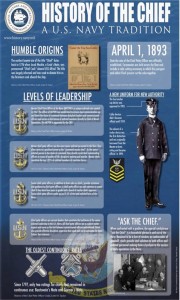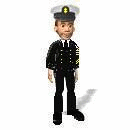By Mass Communication Specialist 1st Class Daniel Garas Defense Logistics Agency Public Affairs
– March 31, 2015
Effectively running and fighting a warship relies on bridging the gap between officers and enlisted personnel. It was from this need that the creation of the rank of chief petty officer was born.
Since the days of antiquity, highly skilled seamen have been prized for their knowledge and skill. As vessels grew more complex, duties began to split into different responsibilities, which evolved into a rating system that was first formally organized by the Royal Navy and later adopted by the U.S. Navy.
This system of rank and position aboard a ship traces its roots to English society. In his book “England’s Sea-Officers,” author Michael Lewis describes the creation of this system as a mix of two hierarchies, one of official ranks and a social divide between gentlemen and non-gentlemen.
According to “History of the Chief Petty Officer Grade,” by U.S. Navy Chief Warrant Officer 4 Lester B. Tucker, the earliest known use of the term dates back to 1776 when Jacob Wasbie, a cook’s mate, was pronounced “Chief Cook” aboard USS Alfred.
Although given the title, Tucker surmises that rather than hold any position of authority amongst the crew, it was to denote him as the foremost cook aboard the ship amongst his peers in his rating.
Perhaps the earliest formal attempt to create the rank of chief petty officer came in 1853. Jason M. Juergens, author of the “Chief Petty Officer Leadership Thesis,” wrote that as manning levels increased to accommodate a growing fleet, attempts to establish the precedence of petty officers under Navy regulations began.
Initially approved by the President, it was revoked a few months later by the attorney general, as only Congress could approve these regulations.
The rank of chief petty officer as it is recognized today was officially established April 1, 1893, and with the exception of schoolmasters, ships’ writers and carpenters’ mates, all petty officers of the first class were automatically shifted to the new rank in April 1895.
Ratings have come and gone to evolve with the modernization of the Navy, but chief petty officers have been used to head these ratings in official capacities since 1893. According to Tucker, only two ratings have remained in continuous use since 1797 – boatswain’s mate and gunner’s mate.
Armed with official recognition, chiefs of the past went on to lay the foundation for their modern day counterparts. As servant-leaders, they acted as the unique lynchpin between officers and enlisted personnel who executed daily operations, and also took a leading role in the career development of junior petty officers.
Additionally, chiefs were celebrated not only for their technical expertise, but their administrative abilities as well. Knowledge in the intricacies of the ship’s daily operations and ability to coordinate with various departments gave chiefs unique abilities that were unrivaled by even the most senior officers.
With this newly recognized position of authority and expertise they were bestowed with uniform devices to recognize their merit. At first, the only distinction was the advent of a rocker to their rating badge. According to Juergens, borrowing the master-at-arms rating that used three stripes, a single rocker was added and became official in 1894. The fouled anchor as a cap device was introduced in 1905; collar devices did not become an official part of the uniform until 1959.
Additionally, chiefs were given their own space on ships. Referred to as the “Chief’s Mess,” it is off-limits to anyone else (officer or enlisted) without invitation and is affectionately called the “Goat Locker.”
Up until the Second World War, chiefs evolved into disciplinarians that exercised and dispended a great deal of unwritten naval law. According to “The Role of the Chief Petty Officer in the Modern Navy” by Don A. Kelso, “they served as exacting supervisors, highly proficient specialists and acted as advocates to higher authority.”
After World War II, the demobilized Navy was left with a top-heavy organization that frequently utilized chiefs in billets normally filled by junior petty officers.
Kelso cites that this overflow of manpower, compounded with administrative overhauls to the Uniform Code of Military Justice, which frowned upon negative enforcement of discipline, began to obscure the basic importance of the chief petty officer in the modern Navy.
The changes did not go unnoticed. As Kelso writes, both chief petty officers and commissioned officers recognized the dangers of reducing the vital role of chiefs from servant leaders to mere figureheads.
Efforts began to repurpose the mess to reflect the prewar role of the chief as leaders, specialists and the main liaison official between officers and the enlisted Sailor.
“The chief petty officer is responsible for three facets of leadership relative to the men placed in his charge,” Kelso writes. The effective discipline of their Sailors, the effective supervising of the work their Sailors perform, and finally, to act as an advocate for their Sailors’ best interests.
These repurposing efforts of the past have carried on reflecting the chief of today’s Navy. Chief petty officers fulfill a vital function in the operation of the Navy’s military and work schedule. Drawing on their past, they serve as technical experts, act as the liaison to commissioned officers and possess the ability to establish and maintain the conditions that provide Sailors with opportunities for success.
The ability to bridge the gap and provide solutions to both officers and enlisted personnel makes them not only silent professionals, but also ensures the old mantra, “ask the Chief,” shall remain a vital part of the Navy well into its future.



